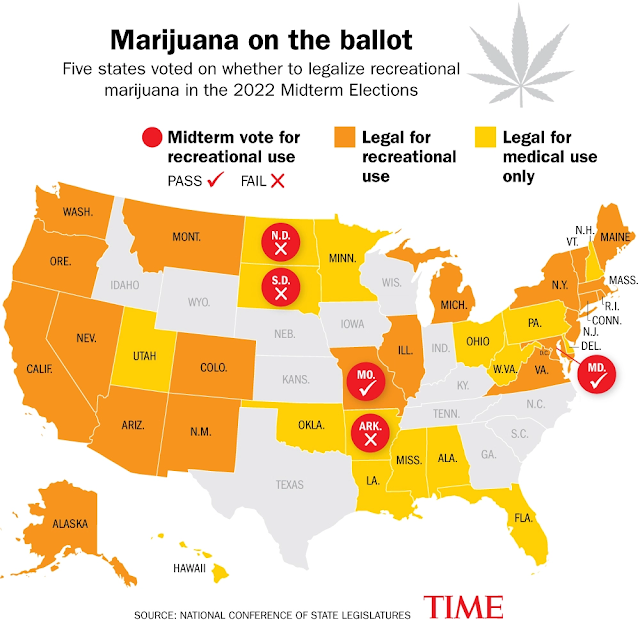The market for legal marijuana in the U.S. is suffering from (literal) growing pains, as large scale legal cultivation runs into both crop diseases, and zoning issues.
As a crop that is legal at the state level in many states, but still illegal under federal law, large cannabis farms don't get some of the benefits regarding the spread of plant diseases that are provided for other crops by the U.S. Department of Agriculture.
The WSJ has the story:
Cannabis Industry Confronts Billion-Dollar Threat: Weak Weed. Pathogen spreading among crops is cutting recreational drug’s potency, forcing growers to cull ‘dudded’ plants. By Dean Seal
"A pathogen is contaminating cannabis crops around the country and threatening to leave billions of dollars of losses in its wake.
"Cannabis researchers and experts are sounding the alarm for what is known as hop latent viroid, or HLVd, and cultivators are stepping up efforts to discover whether their plants are infected. The pathogen can drastically reduce the potency of the psychoactive compounds in marijuana, a phenomenon that growers have long called “dudding.”
...
"Plant pathologists and cannabis experts say the spread of the viroid was likely accelerated by the popularity of weed from California, which legalized cannabis for medical use in 1996.
"The spread also reflects the evolution of the cannabis business into a major agricultural crop. The risk of a new disease expanding increases for any crop that goes from low to high production, as cannabis has in the past two decades, said Jeremy Warren, Dark Heart’s director of plant science.
“You saw the spread happen in the legal states first, like California, where you started having bigger grows and bigger greenhouses that are making thousands and tens of thousands of plants,” Warren said. “In that system, it’s harder to maintain sanitation and it’s easier for a pathogen to take off.”
"The U.S. Agriculture Department typically sets quality standards and inspection requirements for agricultural products, but marijuana’s illegality at the federal level keeps it out of the agency’s purview."
*******
And big farms mean that agriculture and expensive housing may rub shoulders in California. Here's the Guardian on Santa Barbara County.
A beachside city became California’s legal cannabis capital. Not everyone is stoked by Nicholas Schou
"Thanks to the most lenient policies in California for recreational marijuana, Santa Barbara county is now the state’s undisputed capital of legal cannabis, boasting more acres than the storied Emerald Triangle of Humboldt, Trinity and Mendocino counties.
"Santa Barbara voters overwhelmingly backed California’s legalisation of recreational marijuana in 2016, with hopes that the cannabis boom would bring tax revenue and new jobs to the county. The transformation has been fast and furious. Santa Barbara county is now home to around a third of all cultivation licenses issued in California, despite making up only 1.8% of the state’s land, with some megafarms stretching over dozens of acres.
"But the sudden influx of growers has inspired a broad coalition of frustration that spans local high schools, uber-wealthy homeowners and the region’s influential wine industry, who argue the pungent industry threatens to ruin their cherished lifestyle in a region dubbed the “American Riviera”.
...
"The tensions underscore a wider drama playing out in California over the promises of legal weed. Despite broad public support for bringing the industry out of the shadows, seven years on the illicit market is thriving, businesses are struggling to turn a profit, and many on the frontlines of the transition say they have yet to enjoy the returns.
"In fact, for the first time, officials in Santa Barbara are acknowledging that if market trends continue, the cost of the program both to public finances and to quality of life may outweigh any actual benefits.
...
"California’s cannabis market has been operating in a quasi-legal sphere since 1996, when medical marijuana was decriminalized. In 2016, advocates for Proposition 64 successfully argued that decriminalizing all cannabis use would create lucrative tax schemes and rewrite the historic injustices of policing such a widely used drug.
"But Prop 64 allowed cities to choose whether to allow cannabis businesses or not. Many refused to, banning both cultivation and dispensaries. Others, with varying degrees of success and scandal, sought to cash in on the “green rush”.
...
"Santa Barbara is alone among counties in that it taxes farmers based on the value of the marijuana they sell, as opposed to the acreage of their farms. While that strategy works when cannabis values are high, the industry has experienced a massive decline in profitability during the past year. With the sale price of cannabis in the state at roughly a third of its value just a year or so ago, many corporate investors have pulled out of the market entirely, and the number of licensed growers in Santa Barbara county has declined by about 25%.
"As a result, the county is expecting to earn just $7.5m in cannabis tax revenue this year, a 54% decline from 2022 and only half the $15.2m that was expected to fund the county’s latest budget, according to a county report."







